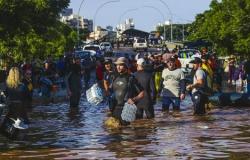publisher3i publisher3 – https://istoedinheiro.com.br/author/editora3/
04/26/2024 – 16:50
SUMMARY
• Pharmacist who gained fame by developing a vaccine against Covid-19 in record time
• Company has already invested more than US$400 million in reforestation projects around the world
• Of these, R$350 million in Brazil alone for reforestation of the Atlantic Forest in SP
It was ten years’ work carried out in ten months. This phrase became known after the approval of the vaccine against Covid-19, in December 2020, by the UK health regulator and refers to the record time to create the vaccine, in partnership with Anglo-Swedish pharmaceutical company AstraZeneca with the University of Oxford. They developed, produced and distributed the vaccine at cost, in one of the first rays of hope in that dark period of recent history.
After the pandemic nightmare, the AstraZeneca continues to seek to maintain its positive image. Anchored in ESG initiatives, the company has bold goals, such as achieve global zero emissions of gases responsible for the greenhouse effect by 2030.
• In Brazilian operations, the company has already managed to achieve 100% of the target.
• For the rest of the operations around the world, it reduced emissions by 67% from 2015 to 2023, considering those related to the company, in addition to indirect emissions, arising from electrical energy purchased for the company’s use.
• In the last year alone the decrease was 14%. For 2026, the cut in global emissions is expected to be 98%.
The company’s relationship with the environment is not new and has a royal touch. Before being crowned, King Charles III, of England, asked the global CEO of AstraZeneca that the binational company lead the green transition process in healthcare, responsible for 5% of global CO2 emissions.
‘GREEN VACCINE’
For the general director of AstraZeneca in Brazil, Olavo Corrêa, the climate issue is the biggest public health crisis of our time. Upon receiving the report from DINHEIRO at the medicine factory in Cotia (SP), Corrêa highlighted that the focus of the company’s actions is to act on the prevention of conditions caused by climate change, such as cancer, respiratory diseases, heart problems and infectious diseases, which, according to him, they already cause more than 10 million deaths per year worldwide.
The pharmaceutical company works on scientific innovation with around 100 clinical studies in partnerships with more than 200 medical centers around the world
To reverse this situation, the company decided to do something productive and scalable for the environment. One of the initiatives implemented was AZ Forest, a project in which more than US$400 million was invested globally, of which R$350 million in Brazil alone for reforestation of the Atlantic Forest in the state of São Paulo. “There will be more than 12 million trees planted here”, says the executive. The reforested area will correspond to the size of 38 Ibirapuera parks and more than 6 thousand football fields.
To date, 1 million trees have already been planted on the Brazilian front of the project, which has generated more than 450 jobs in the Pontal do Paranapanema region. “We want to be an example and show that working in healthcare means going beyond treatment. It is to act before diseases, in the environment and in raising awareness”, stated the executive. Worldwide, AZ Forest Global aims to plant 200 million trees.
The company’s recently released sustainability report brought other data that contributes to the effort to reach the zero carbon target by 2030. Among them:
• obtain 95% of electricity from renewable sources, with the goal of reaching 100% by 2025;
• reduce water footprint by 19.5% (20% by 2025);
• in addition to using 97.6% of packaging and paper-based materials from sustainable sources.
INNOVATION
As much as the ESG agenda is at the center of AstraZeneca’s attention, the pharmaceutical company also works on scientific innovation, with a robust pipeline of new medicines scheduled to be launched by 2030. There are around 100 clinical studies in partnerships with more than 200 medical centers reference for carrying out these researches.
In 2023, AstraZeneca led regulatory approvals in Brazilwith more than 14 approvals for the company’s various therapeutic areas, such as oncology, cardiovascular, renal, metabolic, respiratory, immunological, and rare diseases. By 2030, the company intends to launch 20 new medicines.
A 98% cut in greenhouse gas emissions by 2026 is one of AstraZeneca’s goals, which aims to reach 100% by 2030
Brazil is one of the priority markets for AstraZeneca and a leader in Latin America. According to consultancy Iqvia — focused on data from the healthcare sector — around 30% of the company’s revenue in Brazil comes from the public sector. This year alone, five new medicines have been launched, in addition to the innovation hub in partnership with the USP Technological Research Institute (IPT)a global initiative by AstraZeneca that connects with other hubs around the world.
The total invested globally in R&D was US$10.9 billion in 2023.
• This means that 25% of revenues are used for research and development of new medicines.
• Last year, the company had revenues of US$45 billion.
• The company maintains R&D activities in around 60 countries.
• In Brazil, there are more than 70 clinical studies underway.
“One of the goals is to transform the lives of cancer patients”said Corrêa, citing that most patients with lung cancer are diagnosed late and their survival rate is very short.
According to him, only 18% of patients survive after 5 years. “With a new medicine, we will be able to go from 18% to 36% of patients alive after this period”he said.

The company is also proud to state that it hires a number of PCD employees above the quota required by law. Furthermore, 56% of leadership positions are held by women.
The company has, internally, seven discussion groups assets on diversity and inclusion, such as for black people, women, neurodiverse, among others.
O maternity benefit it was also extended to fathers, who are entitled to three months of leave and can stay at home after the mother returns to work. A set of ESG practices that goes far beyond the necessary planting of trees.








